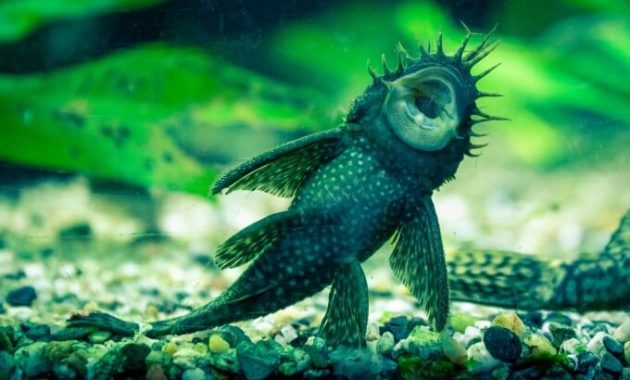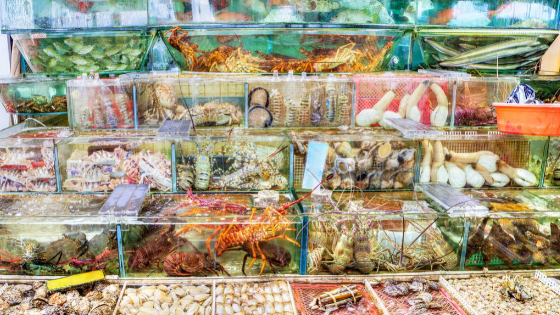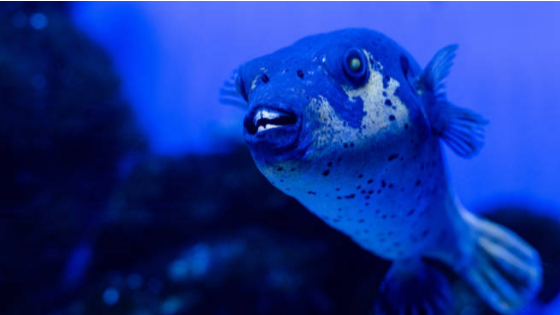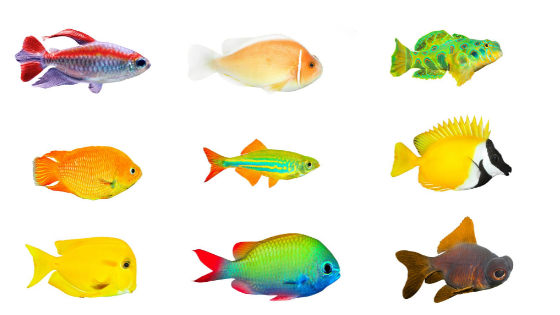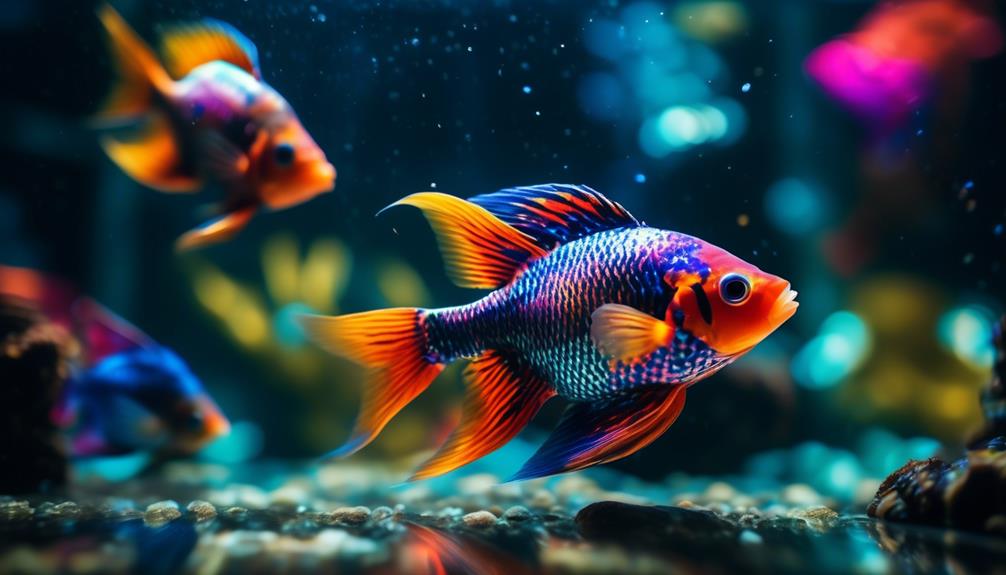
Are you tired of the same old fish swimming in your aquarium, longing for a vibrant and captivating addition that will truly make a statement? Look no further than the exotic paradise fish.
With their dazzling array of colors and graceful movements, these freshwater beauties are sure to be the centerpiece you’ve been searching for.
But that’s not all, there’s so much more to discover about these mesmerizing creatures that will leave you wanting to know more.
So, are you ready to uncover the secrets of the exotic paradise fish and delve into a world of aquatic wonder?
Key Takeaways
- Paradise fish are small, colorful freshwater fish that belong to the gourami family.
- They are hardy and adaptable to various conditions, but prefer heavily planted aquariums with moderately soft water.
- Paradise fish are territorial and it is best to keep one male with a group of females to avoid aggression.
- They are compatible with certain tank mates such as blue gouramis, gold gouramis, opaline gouramis, danios, and clown loaches, but should be avoided with slow-moving fish with long fins and aggressive tank mates of similar size.
About Paradise Fish
If you’re an aquarium enthusiast, you’ll be delighted to learn about the fascinating characteristics of Paradise Fish. These freshwater fish belong to the gourami family and are known for their colorful appearance. They’ve thin, rectangular bodies and long flowing fins, making them a beautiful addition to any tank.
Paradise Fish are non-aggressive in temperament and prefer swimming in the surface and middle regions of the aquarium. They can be kept in a medium-sized tank of around 30 gallons.
When it comes to tank mates, they get along well with Blue Gouramis, Gold Gouramis, Opaline Gouramis, Danios, and Clown Loaches. However, it’s important to avoid slow-moving fish with long fins and aggressive tank mates of similar size.
Suitable Tank Mates
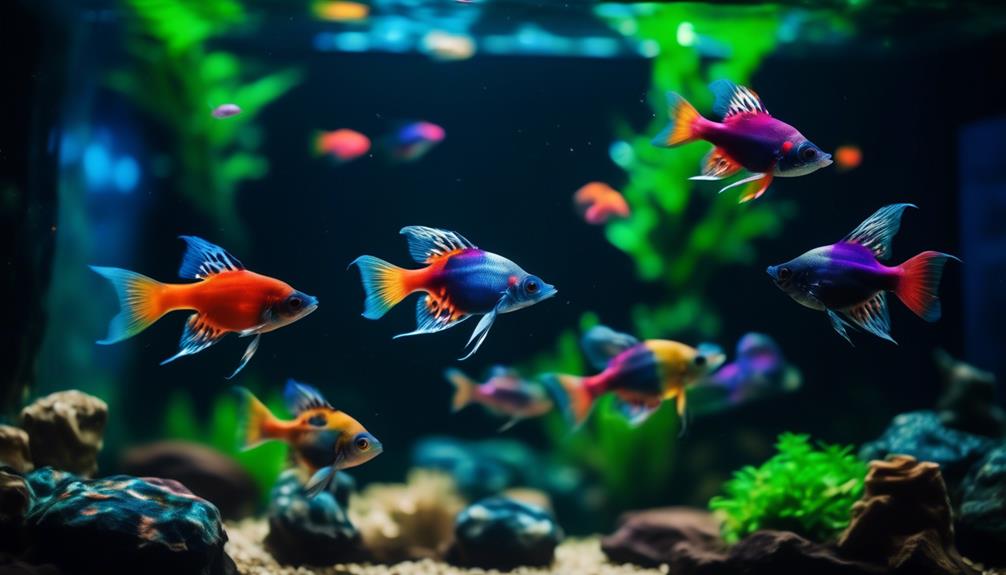
To ensure a harmonious aquarium environment, it’s important to choose suitable tank mates for Paradise Fish. When considering companions for your Paradise Fish, you should look for fish that have similar temperaments and can thrive in the same type of environment. Some suitable tank mates include Blue Gouramis, Gold Gouramis, Opaline Gouramis, Danios, and Clown Loaches.
These fish are compatible with Paradise Fish because they’ve similar size, non-aggressive temperaments, and can coexist peacefully in a medium-sized aquarium. It’s important to avoid slow-moving fish with long fins, as Paradise Fish may nip and harass them. Additionally, aggressive tank mates of similar size should be avoided.
Paradise Fish General Description

Paradise Fish, a colorful species of freshwater fish belonging to the gourami family, captivate aquarium enthusiasts with their vibrant hues and striking appearance. Here is a general description of these fascinating creatures:
- Imported to Europe 150 years ago: Paradise Fish were first introduced to Europe from East Asia a century and a half ago, and they’ve since become popular pets worldwide.
- Thin, rectangular bodies with long flowing fins: These fish have a unique body shape, characterized by their sleek and elongated form. Their fins flow gracefully, adding to their overall beauty.
- Colorful and eye-catching: Paradise Fish are known for their stunning colors, which range from vibrant reds and blues to iridescent greens and purples. They’re truly a sight to behold in any aquarium.
With their mesmerizing appearance and rich history, Paradise Fish are a delightful addition to any fish enthusiast’s collection.
Origins
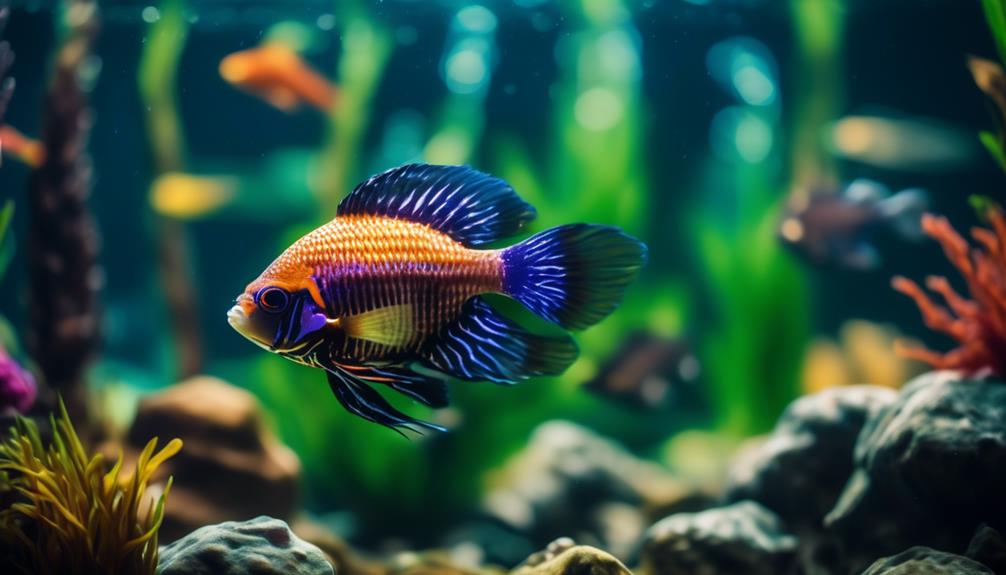
After learning about the general description of Paradise Fish and their captivating appearance, it’s time to explore their origins.
These colorful freshwater fish belong to the gourami family and were imported to Europe around 150 years ago. However, their initial origin can be traced back to East Asia, where they were found in the paddy fields and ditches.
Over time, Paradise Fish have become popular worldwide as pets, thanks to their beauty and adaptability. They can thrive in a variety of conditions and are known for their hardiness.
Maintenance and Care
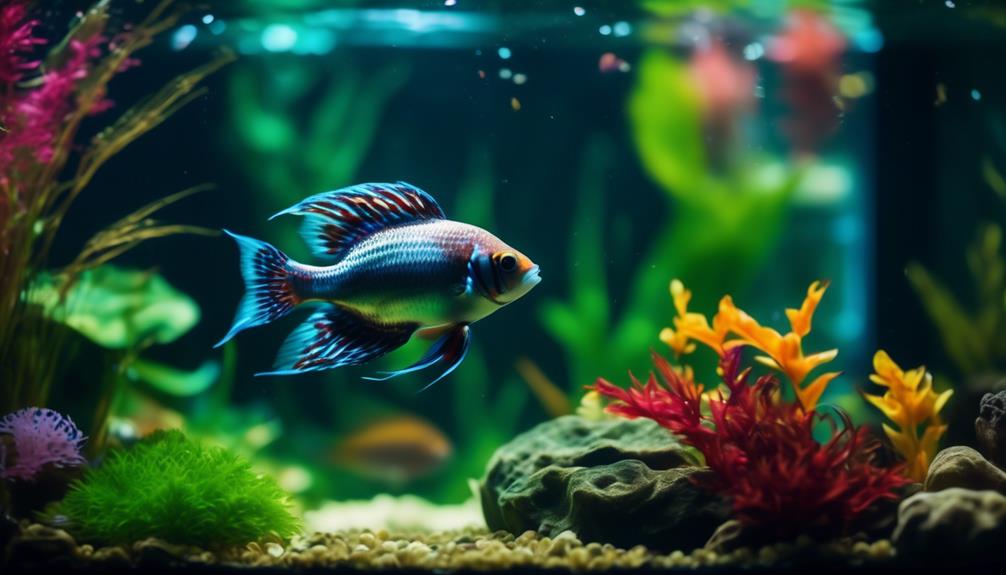
For optimal care of your Paradise Fish, it’s important to provide them with a suitable aquarium environment and meet their specific needs. Here are three key aspects to consider:
- Tank Setup: Paradise Fish prefer heavily planted aquariums with moderately soft water. They also need a calm surface area to breathe, as they’re labyrinth fish. A tank size of at least 30 gallons is recommended to accommodate their medium size.
- Tank Mates: It’s crucial to choose compatible tank mates for your Paradise Fish. Avoid slow-moving fish with long fins, as they may become targets for aggression. Instead, consider housing them with larger non-aggressive cichlids and gouramis.
- Feeding: Paradise Fish are omnivores and will accept most flake and pellet-based foods. However, it’s important to supplement their diet with live foods like mosquito larvae, bloodworms, and daphnia to ensure a balanced diet.
Tank Mates to Avoid
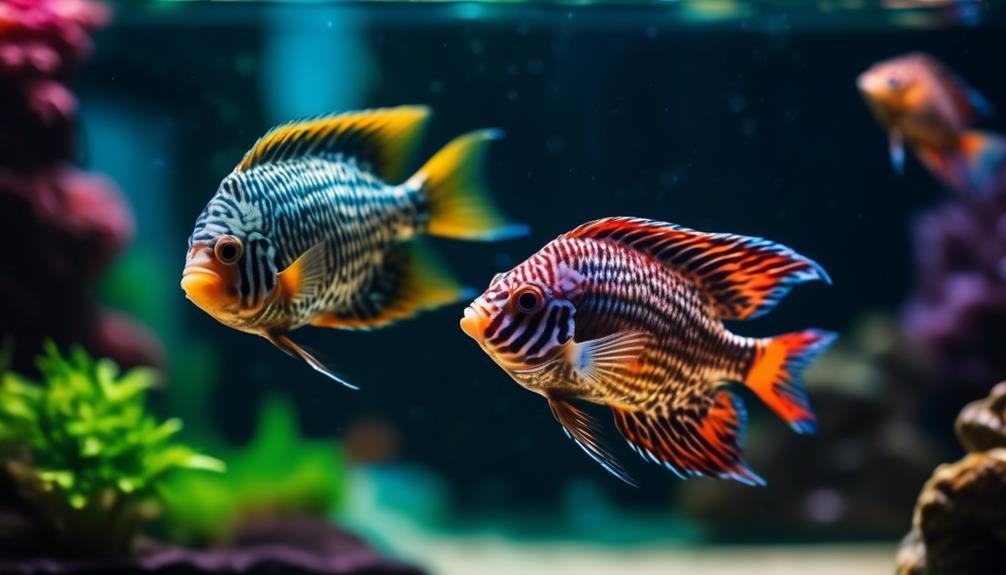
When selecting tank mates for your Paradise Fish, it is important to be aware of certain fish species to avoid. Due to their non-aggressive temperament, Paradise Fish should not be housed with slow-moving fish with long fins such as goldfish or angel fish. They can nip and harass other fish, so it is crucial to avoid aggressive tank mates of similar size. Instead, it is recommended to house them with larger non-aggressive cichlids and gouramis. To provide a clear overview, here is a table highlighting suitable tank mates for Paradise Fish:
| Suitable Tank Mates |
|---|
| Blue Gouramis |
| Gold Gouramis |
| Opaline Gouramis |
| Danios |
| Clown Loaches |
Feeding
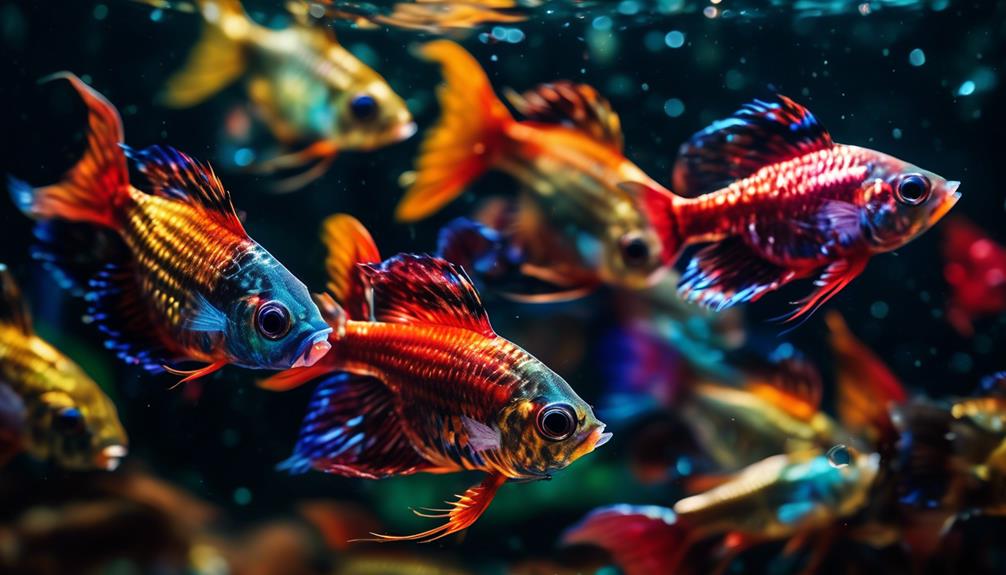
To ensure the health and vitality of your Paradise Fish, it’s important to provide them with a balanced diet consisting of both flake and pellet-based foods, supplemented with live foods like mosquito larvae, bloodworms, and daphnia. Here are three essential reasons why you should feed your Paradise Fish a diverse diet:
- Nutritional Balance: Flake and pellet-based foods offer a good base for your fish’s diet, providing essential vitamins, minerals, and proteins. However, live foods like mosquito larvae, bloodworms, and daphnia add variety and ensure your fish receive all the necessary nutrients to thrive.
- Natural Instincts: Paradise Fish are natural hunters and enjoy chasing and capturing live prey. Feeding them live foods helps satisfy their natural instincts and keeps them mentally stimulated.
- Enhanced Colors: Live foods contain pigments that can enhance the vibrant colors of your Paradise Fish. By incorporating these foods into their diet, you can help your fish achieve their full color potential.
Breeding
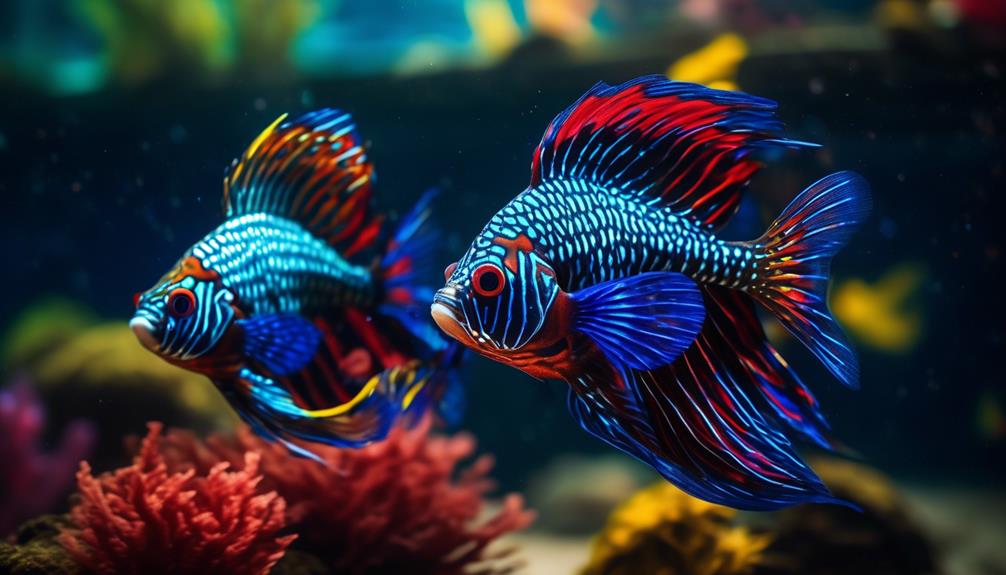
Breeding Paradise Fish is an exciting and rewarding process that allows you to witness the vibrant colors and unique behaviors of these beautiful freshwater fish.
To begin, you’ll need a suitable breeding pair consisting of one male and one female. The male paradise fish is easily distinguishable by its brightly colored body and longer fins.
It’s important to create the right conditions for breeding, which includes providing a separate breeding tank with plenty of plants for the female to lay her eggs on. The water temperature should be around 75-80°F, and the pH level should be slightly acidic.
Once the male has built a bubble nest, the female will lay her eggs and the male will fertilize them.
After spawning, it’s crucial to remove the female from the tank to prevent her from eating the eggs. The male will then take care of the eggs, guarding and tending to them until they hatch.
Breeding paradise fish can be a fascinating experience, allowing you to observe the entire reproductive process and the growth of the fry.
Freshwater Group
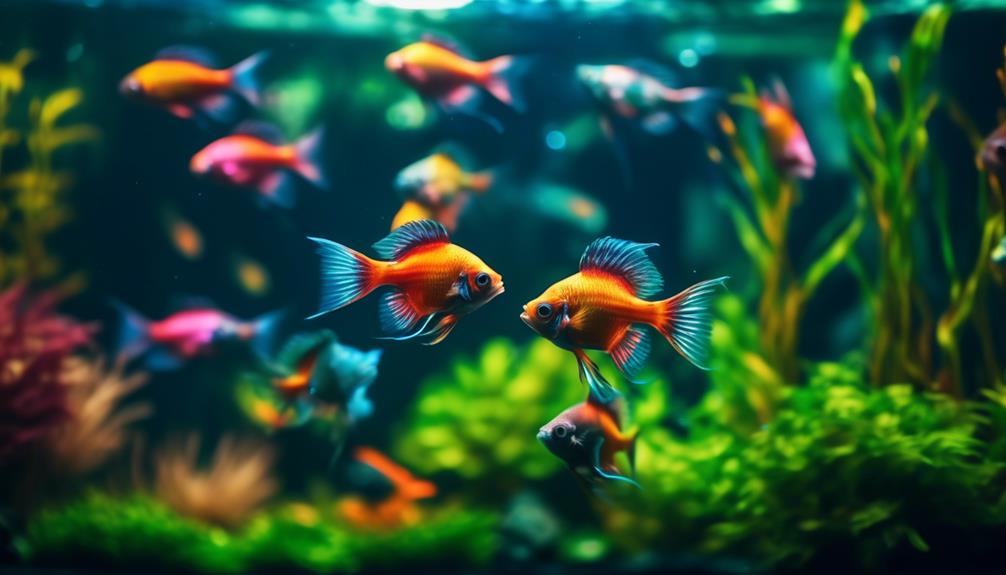
As you continue to explore the fascinating world of breeding paradise fish, let’s now take a closer look at the freshwater group they belong to. Here are three key points to know about the freshwater group:
- Small size: Paradise fish are relatively small in size, making them suitable for medium-sized aquariums of around 30 gallons.
- Non-aggressive temperament: Unlike some other fish species, paradise fish have a non-aggressive temperament, making them compatible with a variety of tank mates.
- Surface/middle swimmers: These colorful fish prefer to swim in the surface and middle regions of the tank, adding movement and vibrancy to your aquarium.
Understanding these characteristics of the freshwater group will help you create a suitable and harmonious environment for your paradise fish.
Small Size
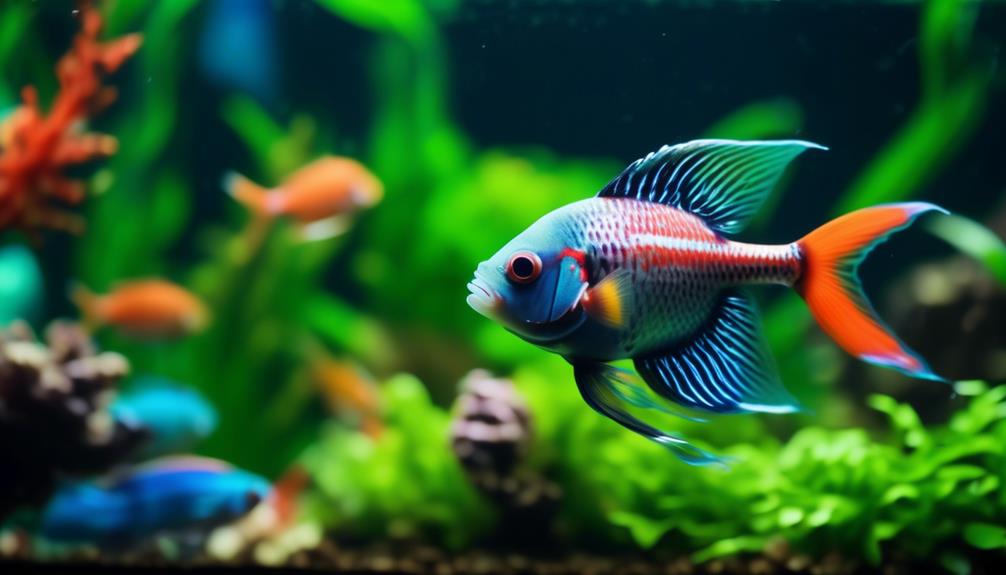
Paradise fish, with their small size, are perfect for medium-sized aquariums of around 30 gallons. These colorful freshwater fish have thin, rectangular bodies and long flowing fins, making them a delightful addition to any aquarium. They’re known for their non-aggressive temperament and can coexist with suitable tank mates such as Blue Gouramis, Gold Gouramis, Opaline Gouramis, Danios, and Clown Loaches.
Paradise fish prefer to swim in the surface and middle regions of the tank, so it’s important to provide them with a calm surface area to breathe. However, they can be highly territorial towards each other, so it’s best to keep one male with a group of females.
With their vibrant colors and small size, paradise fish are sure to bring joy and beauty to your aquarium.
Non-aggressive Temperament
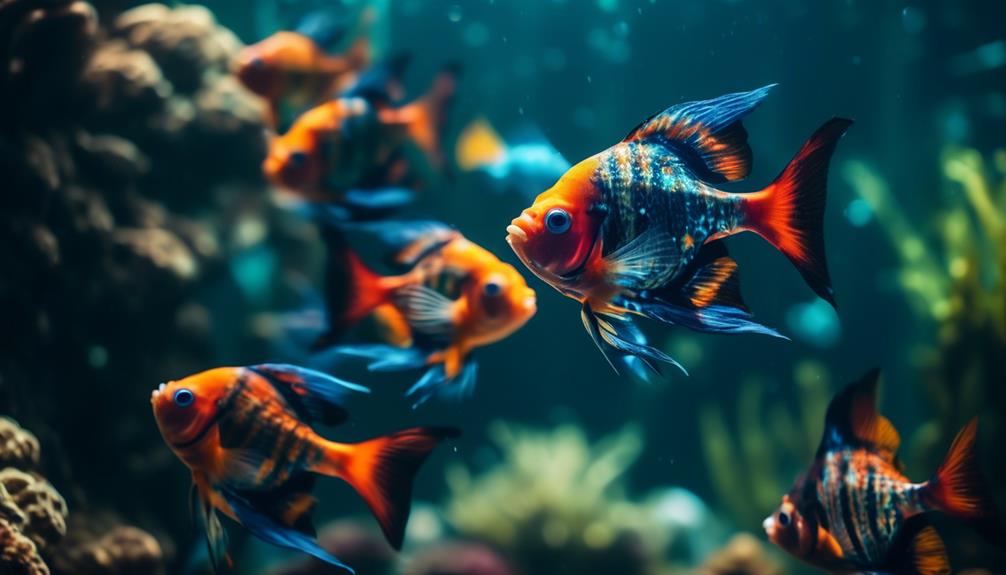
With their peaceful nature, paradise fish make a wonderful addition to any community aquarium. These exotic beauties not only bring vibrant colors but also contribute to a harmonious environment.
Here are three reasons why their non-aggressive temperament is a remarkable trait:
- Peaceful Coexistence: Paradise fish are known for their ability to peacefully coexist with a variety of tank mates. Their calm demeanor ensures a stress-free environment for all inhabitants.
- Compatibility: These fish are highly compatible with other non-aggressive species such as Blue Gouramis, Gold Gouramis, and Opaline Gouramis. This compatibility allows for a diverse and visually appealing community tank.
- Reduced Aggression: Unlike some other fish species, paradise fish have a lower tendency to display aggressive behaviors. This makes them an ideal choice for aquarists looking to maintain a peaceful and harmonious aquarium.
Medium-sized Aquarium
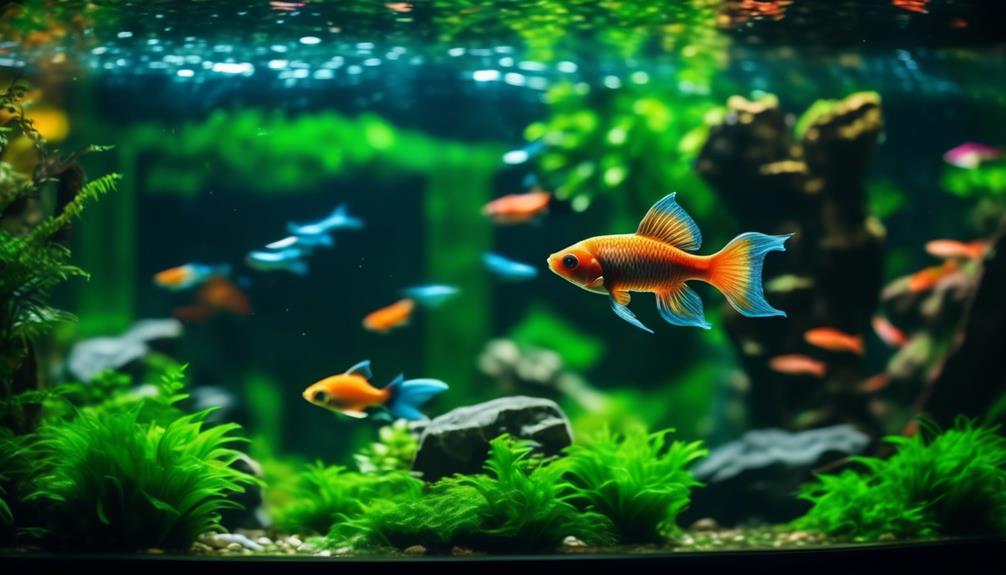
If you’re looking to create a peaceful and visually stunning aquarium, consider setting up a medium-sized tank for your paradise fish and their compatible tank mates. A medium-sized aquarium, around 30 gallons, provides enough space for your paradise fish to swim comfortably in the surface and middle regions of the tank.
It also allows you to add other compatible species to create a harmonious community. Some suitable tank mates for paradise fish include Blue Gouramis, Gold Gouramis, Opaline Gouramis, Danios, and Clown Loaches. Remember to avoid slow-moving fish with long fins, as paradise fish can nip and harass them.
With the right tank mates and suitable aquarium size, you can create a beautiful and tranquil underwater paradise for your exotic paradise fish.
Swim Behavior
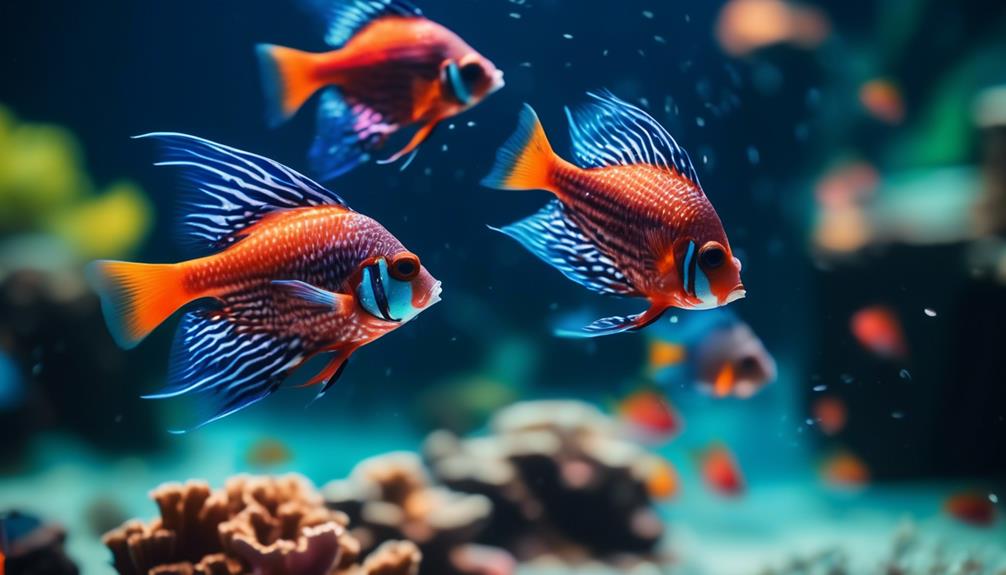
When observing paradise fish in an aquarium, you’ll notice their graceful and lively swim behavior. These vibrant creatures are a delight to watch as they navigate through the water with ease and elegance. Here are three key aspects of their swim behavior that make them truly captivating:
- Spiraling Movements: Paradise fish have a unique way of swimming, often displaying mesmerizing spiraling movements. They effortlessly glide through the water, creating a beautiful visual display that adds charm to any aquarium.
- Surface Skimming: These fish have a preference for swimming in the surface and middle regions of the tank. They often skim the surface, creating ripples and leaving a trail of movement as they explore their surroundings.
- Agile Maneuvering: Paradise fish are known for their agility in the water. They can quickly change direction, darting through plants and obstacles with precision. Their ability to maneuver effortlessly adds an element of excitement to their swim behavior.
Frequently Asked Questions
How Long Do Paradise Fish Typically Live in Captivity?
Paradise fish typically live for 5-8 years in captivity. They are a colorful addition to any aquarium, but their lifespan can be influenced by factors like proper care, diet, and water conditions.
Are Paradise Fish Known to Jump Out of the Aquarium?
Yes, paradise fish are known to jump out of the aquarium. To prevent this, make sure you have a secure lid on the tank to keep them from escaping and causing harm to themselves.
Can Paradise Fish Be Kept in a Community Tank With Other Species of Fish?
Yes, paradise fish can be kept in a community tank with other species of fish. They are non-aggressive and can coexist with suitable tank mates like blue gouramis, gold gouramis, and danios.
Do Paradise Fish Require a Specific Water Temperature and Ph Level?
Paradise fish require specific water temperature and pH levels for optimal health. Keep the water temperature between 72-82°F and the pH level between 6.0-7.5. Regular monitoring and adjustments will ensure a suitable environment for your fish.
Are There Any Specific Diseases or Health Issues That Paradise Fish Are Prone To?
Paradise fish are prone to diseases and health issues. It is important to monitor water quality, provide a balanced diet, and prevent stress. Common diseases include fin rot, ich, and swim bladder issues.
Are Glass Fish Suitable for the Same Aquarium as Paradise Fish?
Yes, mystical glass fish marvels can coexist with paradise fish in the same aquarium. These transparent creatures are peaceful and can add a unique beauty to the tank. However, it’s important to monitor their compatibility and ensure the tank size and conditions are suitable for both species.
Conclusion
In conclusion, the exotic paradise fish is a vibrant and captivating addition to any aquarium. With their stunning colors and graceful movements, they’re sure to be a delightful centerpiece. These hardy fish are adaptable to various conditions and prefer a calm surface area to breathe.
When choosing tank mates, it’s important to select non-aggressive fish of a larger size. Feeding them is easy, as they readily accept various foods.
Dive into the world of paradise fish and enhance your aquarium experience today!

